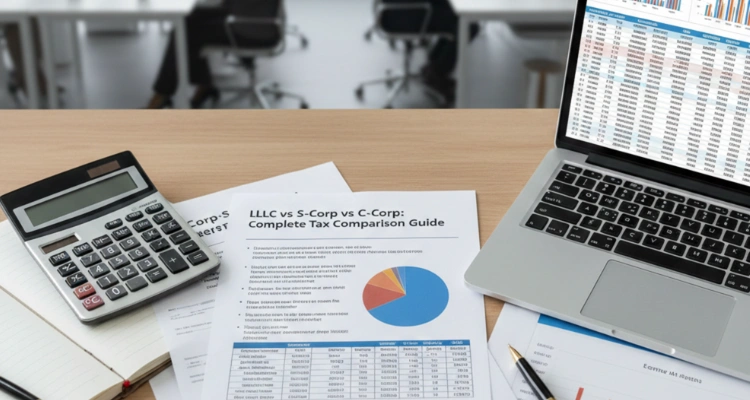Tax season is incredibly stressful for S-Corp owners.
You've got a million forms to file. Endless regulations to follow. And the constant fear of making a mistake that triggers an IRS audit.
Sound familiar?
If you're nodding your head right now, you're in the right place. Today, I'm going to break down everything you need to know about S-Corps and 1099 forms.
Why should you care about this?
Because getting this wrong can cost you thousands in penalties and wasted time.
But get it right, and you'll save money, stay compliant, and sleep better at night.
In this guide, you'll learn:
- Exactly when your S-Corp needs to receive or issue 1099 forms
- The step-by-step process for proper 1099 filing (with zero confusion)
- 5 critical mistakes that trigger IRS red flags (and how to avoid them)
Let’s dive in!
What are S-Corps?
S corporations (or "S-Corps" for short) are a special business structure that blends the liability protection of a corporation with the tax benefits of a partnership.
An S-Corp is actually a regular corporation that has filed a special election with the IRS (using Form 2553) to be taxed differently. Instead of being taxed as a separate entity like a traditional C corporation, an S-Corp is what's known as a "pass-through entity."
What exactly is a "pass-through entity"?
It means that the business itself doesn't pay federal income taxes. Instead, profits and losses "pass through" directly to the shareholders' personal tax returns.
This is a significant advantage because it eliminates the dreaded double taxation problem that regular C corporations face.
In a C-Corp, the company pays taxes on its profits at the corporate level (currently 21%), and then shareholders pay taxes AGAIN on any dividends they receive. That's money being taxed twice!
With an S-Corp, you only get taxed once. The business profits flow through to your personal tax return, and you pay taxes at your individual tax rate.
Overview of 1099 Forms
1099 forms are not a single form. They're actually a whole family of tax forms.
The purpose of these forms is to help the IRS track income that isn't reported on a W-2 (the form used for regular employee wages).
These information returns are used to report various types of payments made to individuals and entities who aren't your employees. The person or business making the payment files the form, and both the recipient and the IRS get copies.
In other words, 1099s create a paper trail for money flowing outside of traditional employer-employee relationships.
The Most Common Types of 1099 Forms
There are over 20 different types of 1099 forms, but these are the ones you'll most likely encounter as a business owner:
1099-NEC (Nonemployee Compensation)
This is a big one for most business owners. Use this form when you pay:
- Independent contractors
- Freelancers
- Self-employed individuals
- Other service providers who aren't your employees
If you paid someone $600 or more for services during the year, you'll need to issue this form.
1099-MISC (Miscellaneous Information)
Before 2020, this was the go-to form for contractor payments. Now, it's used primarily for:
- Rent payments of $600 or more
- Prizes and awards
- Other miscellaneous payments
- Attorney fees
- Gross proceeds paid to attorneys
1099-K (Payment Card and Third Party Network Transactions)
This form reports payments received through:
- Credit/debit cards
- Third-party payment networks (like PayPal, Venmo, etc.)
Starting in 2024, the threshold for 1099-K reporting is $5,000 (down from the previous $20,000 and 200 transactions threshold).
1099-INT (Interest Income)
Banks and financial institutions use this form to report interest payments of $10 or more.
1099-DIV (Dividends and Distributions)
This reports the dividend payments and distributions from investments.
Key Filing Deadlines for 1099 Forms
Missing these deadlines can result in penalties, so mark your calendar:
For 1099-NEC:
- Must be provided to recipients by January 31
- Must be filed with the IRS by January 31 (same deadline!)
For 1099-MISC and most other 1099 forms:
- Must be provided to recipients by January 31
- Must be filed with the IRS by February 28 (if filing on paper)
- Must be filed with the IRS by March 31 (if filing electronically)
Do S-Corps Get 1099 Forms?
The short answer: Generally, no.
But (and this is an important but) there are some important exceptions you need to know about.
Let's break it down.
According to IRS guidelines, corporations (including S-Corps) are typically exempt from receiving 1099 forms for services they provide. This is because they're considered separate legal entities with their own stringent reporting requirements.
What does this mean in practical terms?
If your business pays an S corporation for services, you generally don't need to send them a 1099 form – even if you paid them more than $600 during the tax year.
This exemption applies whether you're paying:
- An S-Corp for consulting work
- An S-Corp for marketing services
- An S-Corp for any other type of service
The logic behind this rule is simple: S corporations already have strict tax filing requirements, so the IRS doesn't need the additional reporting that 1099 forms provide.
When Does an S-Corp Receive a 1099 Form?
Before you decide never to send a 1099 to an S-Corp, you need to know about these crucial exceptions.
S corporations SHOULD receive 1099 forms in these specific situations:
1. Legal Services
If you pay an S corporation for legal services, you must issue a 1099, regardless of its corporate status. This applies to:
- Attorney fees
- Legal consulting
- Settlement payments to attorneys
2. Medical and Healthcare Services
Payments to for-profit medical and healthcare service providers require a 1099, even if they're organized as an S corporation. This includes:
- Doctor services
- Medical testing
- Other healthcare-related payments
3. Substitute Payments
Any substitute payments in lieu of tax-exempt interest or dividends also require a 1099.
Step-by-Step Guide to 1099 Filing for S-Corps
Filing 1099 forms can feel overwhelming, especially when you're juggling all the other responsibilities that come with running an S corporation.
Here’s a simple, actionable process you can follow to stay compliant and avoid those nasty IRS penalties.
Step 1: Collect W-9 Forms from Your Vendors EARLY
This is a step MANY business owners skip until it's too late.
Before you make any payments to vendors or contractors, you should have them complete Form W-9 (Request for Taxpayer Identification Number and Certification).
This form provides you with all the information you'll need to properly file 1099 forms later, including:
- The vendor's legal name
- Their business name (if different)
- Their tax classification (individual, LLC, corporation, etc.)
- Their address
- Their Taxpayer Identification Number (TIN) or Social Security Number (SSN)
Step 2: Keep Accurate Payment Records Throughout the Year
To make 1099 filing painless, maintain clean records of all payments made to each vendor. Your accounting software should help with this, but make sure you're tracking:
- Total amounts paid to each vendor
- Dates of payments
- Purpose of payments
- Payment methods
This information will help you determine which vendors need 1099s and fill them out correctly.
Step 3: Identify Who Needs to Receive 1099s
At the end of the year, review your payment records to identify which vendors require a 1099.
Remember, you generally don't need to issue 1099s to:
- Corporations (with exceptions for attorneys and healthcare providers)
- Employees (they get W-2s instead)
- Vendors paid less than $600 during the year
- Vendors paid via credit card or payment processors (these are reported on 1099-K by the processor)
Create a list of everyone who needs to receive a 1099 form along with their information from the W-9 forms you collected.
Step 4: Choose Your Filing Method
Starting in 2024, if you have 10 or more information returns of any type (including W-2s, 1099s, etc.), you MUST file electronically.
You have several options for filing:
Option 1: Use IRS's IRIS Portal
The IRS offers a free online filing portal called the Information Returns Intake System (IRIS) for businesses to file 1099 forms electronically.
Option 2: Use Tax Software
Many accounting or tax preparation software options include 1099 filing features, such as:
- QuickBooks
- Xero
- TurboTax Business
- Tax1099
- Track1099
Option 3: Hire a Professional
Your accountant or tax professional can prepare and file your 1099 forms for you.
Step 5: Prepare the Correct 1099 Forms
For most payments to non-employees, you'll use:
Form 1099-NEC: For payments for services performed by non-employees
Form 1099-MISC: For rent, royalties, prizes, and other miscellaneous payments
Each form requires specific information, so make sure you're completing the right form for each type of payment.
Step 6: Meet the Filing Deadlines (CRUCIAL!)
The IRS has strict deadlines for 1099 filing, and the penalties for missing them can be severe:
For Form 1099-NEC:
- Give to recipients by January 31, 2025
- File with the IRS by January 31, 2025 (same deadline!)
For Form 1099-MISC and most other 1099 forms:
- Give to recipients by January 31, 2025
- File with the IRS by February 28, 2025 (if filing on paper)
- File with the IRS by March 31, 2025 (if filing electronically)
Step 7: Distribute 1099 Forms to Recipients
You must provide copies of the 1099 forms to your recipients by January 31, 2025. You can do this by:
- Mailing physical copies
- Providing electronic copies (if recipients have consented to electronic delivery)
Remember to keep proof of delivery in case questions arise later.
Step 8: File 1099 Forms with the IRS
After distributing copies to recipients, you need to file the forms with the IRS:
If Filing on Paper (less than 10 forms only):
- Complete Form 1096 (Annual Summary and Transmittal of U.S. Information Returns)
- Mail Form 1096 with all your 1099 forms to the appropriate IRS address
If Filing Electronically (required for 10+ forms):
- Submit through the IRIS portal or other approved e-filing method
- No Form 1096 is needed for electronic filing
Step 9: File with State Tax Agencies (If Required)
Many states require you to file 1099 information with their tax agencies as well.
Therefore, you need to check your state's requirements, as deadlines and methods vary.
Some states participate in the Combined Federal/State Filing Program, which means the IRS will automatically forward your 1099 information to participating states.
Step 10: Keep Records of All Filed Forms
Finally, it’s recommended to maintain copies of all 1099 forms you've filed, along with delivery confirmations and filing receipts, for at least four years.
These records are essential if you're ever audited.
S-Corps and Federal Income Taxes
One of the main advantages of having an S corporation is its tax treatment.
This section explains how S-Corps are taxed at the federal level and what you need to know to remain compliant while optimizing your tax position.
Pass-Through Taxation
S corporations are pass-through entities, which means they don't pay federal income taxes at the corporate level, unlike C corporations.
Instead, the company's:
- Income
- Losses
- Deductions
- Credits
Flow directly to shareholders, who report these items on their personal tax returns and pay taxes at their individual income tax rates, usually on Schedule E of Form 1040.
This structure eliminates the double taxation issue that C corporations face, where profits are taxed at both the corporate level and again when distributed as dividends to shareholders.
Required Tax Filings
Even though S-Corps don't pay federal income tax themselves, they must still file certain forms:
Form 1120-S: All S corporations must file this annual information return to report:
- Business income
- Deductions
- Credits
- Other tax information
Schedule K-1: S-Corps must provide this form to each shareholder showing their proportionate share of:
- Ordinary business income/loss
- Rental income
- Interest and dividends
- Capital gains/losses
- Charitable contributions
- Other tax items
Reasonable Compensation Requirements
The IRS requires S-Corp shareholders who are active in the business to receive "reasonable compensation" for their services before taking any non-wage distributions.
This reasonable salary:
- Must be comparable to what other businesses pay for similar services
- Is subject to payroll taxes (Social Security and Medicare)
- Should be documented and justified based on the duties performed
Here's why this matters: Any profit distributed beyond your salary isn't subject to self-employment tax (15.3%), resulting in potential tax savings.
S-Corp tax advantages can be significant but come with compliance requirements and administrative responsibilities.
However, before making any tax decisions, consult with a qualified tax professional who can evaluate your specific situation and help you optimize your tax strategy while maintaining compliance with IRS regulations.
Tax Impact of S-Corp Distributions
When you're an S-Corp shareholder, you can receive income in two ways:
- Salary payments - Subject to payroll and self-employment taxes (15.3%)
- Shareholder distributions - Not subject to self-employment taxes
This dual-income structure creates a significant tax advantage. While you must pay yourself a reasonable salary first, any additional profits can be taken as distributions that avoid the 15.3% self-employment tax burden.
However, if your distributions exceed your stock basis (your total financial investment in the corporation), the excess gets taxed as long-term capital gains on your individual tax return.
For example:
Stock basis: $50,000
Distribution received: $75,000
Taxable as capital gain: $25,000
Managing your distributions strategically can help optimize your tax position, but it requires careful tracking of your stock basis. For complex distribution scenarios or personalized guidance, consulting with a qualified tax professional is strongly recommended.
Common Mistakes and How to Avoid Them
Even experienced business owners can make costly errors when managing S corporations and handling 1099 forms.
Below are the common mistakes and practical solutions to help you avoid them.
Misclassification of workers (employees vs. contractors)
The Problem
Incorrectly classifying employees as independent contractors is one of the most expensive mistakes S corporation owners make.
Misclassification can lead to severe penalties from the Department of Labor (DOL), IRS, and state agencies, potentially costing your business millions, depending on the severity and duration of the violation.
Potential Consequences
If you misclassify workers, you may face:
- Back payment of employment taxes (income tax withholding, Social Security, and Medicare)
- Penalties of up to $1,000 per misclassified worker
- Payment of back wages and overtime
- Benefits restitution (retirement plans, health insurance, etc.)
- State-specific penalties (which can range from $5,000 to $25,000 per violation)
How to Avoid This Mistake
- Apply the IRS control test: Examine whether you control what the worker does and how they perform their job.
- Evaluate financial relationship: Independent contractors typically use their own equipment, set their own hours, and may work for multiple clients.
- Document the relationship: Create clear written agreements for all contractor relationships.
- Consult a professional: Tax advisors or employment lawyers can help determine proper classification.
- Consider the IRS Voluntary Classification Settlement Program: If you've misclassified workers, this program allows you to reclassify contractors as employees with reduced penalties.
Inadequate recordkeeping for 1099 payments
The Problem
Many S corporation owners fail to maintain proper records of payments made to contractors and vendors, making it difficult to accurately prepare and file 1099 forms.
Potential Consequences
Poor recordkeeping can lead to:
- Missed filing deadlines
- Inaccurate reporting
- Potential audit triggers
- Penalties for failure to file required forms
- Increased administrative burden at tax time
How to Avoid This Mistake
- Implement a systematic payment tracking system: Use accounting software that categorizes payments by vendor.
- Collect W-9 forms before making payments: Obtain these forms from all vendors before you pay them to ensure you have accurate tax information.
- Keep digital copies of all 1099-related documentation: Store contracts, invoices, and payment records securely.
- Update vendor information annually: Verify contact information and tax identification numbers at the beginning of each year.
- Separate personal and business expenses: Maintain separate accounts to avoid confusion.
Missed filing deadlines
The Problem
The IRS has strict deadlines for filing 1099 forms.
Missing these deadlines can result in significant penalties, even if the forms are only a few days late.
Potential Consequences
Late filing penalties scale based on how late you file:
- $60 per form if filed within 30 days after the deadline
- $130 per form if filed more than 30 days late but before August 1
- $330 per form if filed after August 1
- Up to $3,987,000 in maximum penalties for large businesses ($1,329,000 for small businesses)
How to Avoid This Mistake
- Mark key dates on your calendar: Set reminders at least one month before deadlines.
- Consider e-filing: Electronic filing gives you more time for certain forms and reduces errors.
- Prepare forms early: Don't wait until the last minute to gather information.
- Use Form 8809 for extensions: This form allows you to request a 30-day extension if needed.
Improper reporting of certain payment types
The Problem
S corporation owners often struggle with determining which payments require 1099 reporting and which forms to use for different types of payments.
Potential Consequences
Incorrect reporting can lead to:
- IRS notices and correspondence
- Potential audits
- Penalties for filing incorrect forms
- Vendor confusion and relationship strain
How to Avoid This Mistake
Know which payments require 1099 reporting:
- Services performed by non-employees (1099-NEC)
- Rent payments to individuals (1099-MISC)
- Attorney fees, even to incorporated law firms (1099-NEC or 1099-MISC, Box 10)
- Medical and healthcare payments (1099-MISC)
Understand exemptions from 1099 reporting:
- Payments to C corporations (with exceptions noted above)
- Payments for merchandise or inventory
- Payments under $600 in a calendar year
- Payments made via credit card or payment processor (these are reported on 1099-K by the processor)
Use the correct 1099 form:
- 1099-NEC for non-employee compensation
- 1099-MISC for rent, royalties, prizes, and other miscellaneous payments
- 1099-INT for interest payments
- 1099-DIV for dividends
Failing to meet reasonable compensation requirements
The Problem
S corporation shareholders who work in the business must pay themselves "reasonable compensation" before taking distributions.
Many owners set artificially low salaries to reduce payroll taxes.
Potential Consequences
The IRS actively looks for this issue in S corporation returns, and the penalties can be severe:
- Reclassification of distributions as wages
- Back payroll taxes, interest, and penalties
- Potential audit of other tax years
- Possible challenge to S corporation status
How to Avoid This Mistake
- Research industry standards: Look at what comparable businesses pay for similar services.
- Document how you determine your salary: Keep records of your research and reasoning.
- Review compensation annually: As your business grows, your salary should reflect your changing role.
- Maintain a reasonable salary-to-distribution ratio: While there's no fixed rule, many tax professionals suggest that salary should be at least 40-60% of total compensation.
End Note
Running an S-Corp means dealing with more paperwork and compliance requirements than a simple sole proprietorship.
But the tax savings? Totally worth it.
If you're like most business owners, your head is probably spinning with all this information about S-Corps and 1099 forms.
Don't worry. It's NORMAL to feel a bit overwhelmed.
Managing an S corporation while staying compliant with 1099 requirements can be challenging.
If you need professional guidance, Virtue CPAs is here to help.
Our team specializes in S corporation tax planning and compliance with services that include:
- Setting up proper compliance systems
- Reviewing your compensation structure
- Tracking basis accurately
- Ensuring the timely filing of all required forms
- Protecting you from potential penalties
Contact Virtue CPAs to schedule a consultation.







